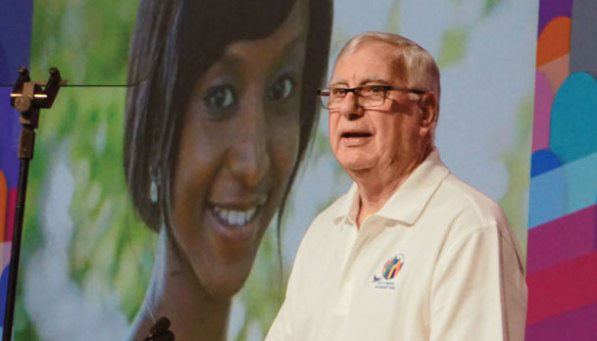RI President Elect Ian Riseley announced at the International Assembly a modified and new version of the earlier and immensely popular GSE (Group Study Exchange) programme. “Many Rotarians, myself included, miss the cultural aspect of the old programme. The opportunity to build world understanding and peace through a short exchange of our best and brightest people.” Some districts have continued with the programme, he said, but “many leaders within those districts say they have difficulty in locating the exchange partners… because right now there is no process or mechanism for sharing this information.”

It was this new confidence that helped me overcome my basic shyness and dare to take new and more difficult challenges, including the rigour of a law school.
— PRIP Ray Klinginsmith
So the RI Board had debated “how do we meet this need? How do we make it happen?” Riseley said he found an opportunity for such exchanges “already existed in a limited way under the Rotary friendship exchange policy.” So he had requested the Board to make a change in the existing policy. The amendment has now been made and from “July 1, 2017, we encourage you to plan group cultural exchanges, or GCEs, which will be run under the banner of the Rotary Friendship Exchange Programme and it will include both Rotarians and non-Rotarians.”
Riseley clarified the districts would have the flexibility to formulate their own programmes and “that programme isn’t intended to replace any other programme, such as the VTTs that the clubs presently undertake. It simply provides another avenue for building world understanding, allowing us to again create an experience that was of such great value to so many.”
No TRF funding
But the RIPE made it clear that the Group Cultural Exchanges will not be funded by TRF. “I appreciate that some districts are using their District Grants for such exchanges, of course subject to the rules of such grants.” The RI staff at Evanston were available to guide the clubs and districts on the rules. But there would be flexibility on whether these were funded from district funds, the clubs or individuals. And home-stays would mean only travel cost, which would be “modest compared to the benefits.”
Riseley advised the DGEs to appoint a Rotary Friendship Exchange Chair in their districts for this and urged them to make full use of their time at the IA to identify partners, adding, “I am very pleased and excited this will be a tremendous experience we can once again offer in Rotary.”
Finding the real me
Addressing one of the general sessions on Partnerships, PRIP Ray Klinginsmith said the first major programme of the TRF, the international scholarship programme, was started in 1948 with 18 scholars travelling around the world. “And it continued as the only programme of TRF till 1965 when the GSE and Special Grants programmes were added.”
Many Rotarians, myself included, miss the cultural aspect of the old programme. The opportunity to build world understanding and peace through a short exchange of our best and brightest people.
— RIPE Ian Riseley
There were about 100 scholars a year and he was highly fortunate to be selected a Rotary scholar in 1960–61. Now there were more than 40,000 alumni for the programme “which is truly due to the generosity of Rotarians”. He himself never tired of talking about the “personal value of my scholarship in all my Rotary speeches because I am proud to be a product of TRF. Being in another country for a full academic year is a wonderful learning experience.”
But unfortunately most of those scholars never became Rotarians, but what could not be denied was that this experience changed their lives forever and contributed in a major way to what they went on to become. “The challenges of living in a new culture, acquiring friends from totally different backgrounds, developing new skills, and above all, the ability to do the right thing”; these were tremendous opportunities that were eloquently summed up by a Rotary scholar who had said how the Rotary scholarship had helped him to become “the real me”.
Ray added: “It was this new confidence that helped me overcome my basic shyness and dare to take new and more difficult challenges, including the rigour of a law school. It was more than a life-changing experience; it was a life shaping experience that set me into a legal career with the commitment to help other people. Rotary was the perfect partner for me to fulfill that commitment and I will always be grateful to Rotary for my school in South Africa. Because of you and Rotary, I am the real me.
Pictures by Rasheeda Bhagat
Music, humour define the IA
When RIPE Ian Riseley returned to the podium after Ray Klinginsmith’s address, he congratulated him for his great speech, and quipped, “though I can’t imagine Ray having basic shyness”!
It was this light touch and the humour, and above all the peppy music that marked all the sessions, that added a celebratory ambience to the entire Assembly proceedings. Riseley admitted that he himself had personally chosen all the music clips and with great care to ensure the clip matched the personality of the speaker who next came on the stage.
He himself often came to the stage to begin a session, dancing and jiving to the music, and in every which way, all this helped transmit the message to the 500-plus DGEs and their spouses assembled in the Grand Hall that their President-elect wore his leadership mantle lightly.
Whether it was RI President John Germ or Riseley or other leaders, they never missed an opportunity to encourage and urge the DGEs to mingle with Governors from other countries, other regions, other cultures, because the friendships they would make, the relationships they would forge here, would stay with them for a lifetime.






